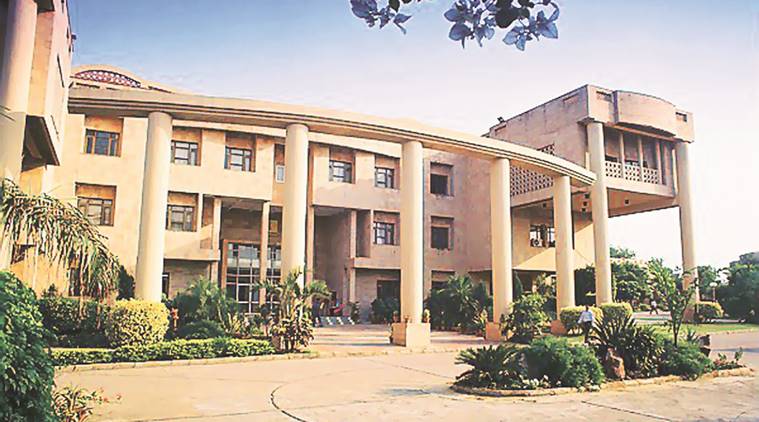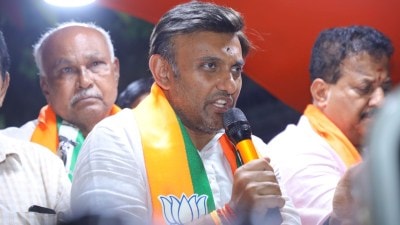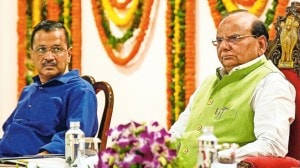- India
- International
New ICSSR chief: Caste because of invasions, Narendra Modi is best Prime Minister
Kumar succeeded Sukhdeo Thorat, who was the council’s chairman since April 2011.
 B B Kumar was appointed ICSSR chairman on May 2
B B Kumar was appointed ICSSR chairman on May 2
NARENDRA MODI is the best prime minister and the worst victim of intolerance; caste in its present form and untouchability are a result of Arab, Turk and Mughal invasions; Macaulayism and the dominance of Marxists led to India’s intellectual decline; and, the Opposition’s support to JNU students hurt nationalistic sentiments. These are the views of B B Kumar, the newly-appointed chairman of the Indian Council Of Social Science Research (ICSSR), which were published in the form of signed editorials in Dialogue, an English quarterly journal he edits, over the last two years.
As first reported by The Indian Express, Kumar, an anthropologist by training, was appointed on May 2 by the HRD Ministry as the head of ICSSR, the apex body for promoting research in social sciences. He joined office on May 5.
Kumar succeeded Sukhdeo Thorat, who was the council’s chairman since April 2011. The 76-year-old was shortlisted by a panel with Ashok Modak, National Research Professor and former BJP MLC from Maharashtra, and historian Satish Mittal, president of the RSS-backed Akhil Bharathiya Itihaas Sankalan Yojana, as members.
Kumar is ex-principal of Sao Change Government College, Tuensang (Nagaland), and Science College, Kohima, and has written, edited and co-authored 136 books.
Excerpts from Kumar’s editorials in Dialogue between 2015 and 2016:
Victim of intolerance
In an editorial titled ‘Learn to tolerate Modi’, which was published in the 2015 October-December edition, Kumar criticised the Prime Minister’s adversaries:

“Narendra Modi has proved himself to be the best Prime Minister. The economy of the country was in bad shape, when he came to power; in the brief period, we have overtaken China in GDP growth; steps have been taken towards economic empowerment of the people, foreign investment is coming in a big way, no cases of corruption or scams have come up…
“The problem with the adversaries of Narendra Modi, is that they lack the realisation that while trying to harm Narendra Modi, they are harming the country. Narendra Modi became PM in spite of more than a decade long warnings, and lodging court cases against him. Obviously people of India did not believe Modi-baiters…
“A fact, which many of us feel, and feel deeply, is that there is none in India, who has suffered more due to intolerance than Narendra Modi. It is time his adversaries should try to learn to tolerate him.”
Untouchability due to conversion
In an editorial published in the January-March issue of 2016, Kumar wrote:
“(Arab scholar) Al-Biruni, only a thousand years ago, talks of only the four castes, and all sitting and eating at one place; no caste proliferation, and no untouchability…
“Aggressive anti-Hindu agenda of conversion of the Muslim rulers, their capture and sale of Hindus as slaves, etc., led lakhs of Hindus to run away to the forests for saving themselves; many started taking pig’s flesh to avoid becoming Muslims; they, eventually, become Scheduled Tribes and Scheduled Castes… A point, needing emphasis, is that caste in the present form, untouchability and intra-Hindu societal exploitation are entirely non-Hindu factors. Dominant JNU type scholarship in the field of Social Sciences has neither the tendency nor the will and understanding to put the discourse in proper perspective.”
Marxism led to decline
Kumar describes Macaulayism and Marxism as the “most potent weapons imported by the Britishers in India”. In the July-September issue of 2015, he wrote:
“The British knew that the Marxism was helpful for British Empire; and that was the reason that they used to supply Marxist literature to the freedom fighters in jails, and the latter used to come out from the jails as Marxists…
“We are gradually losing the capacity to generate original ideas, and the reason behind the same is the continuance of Macaulayist education system and dominance of Marxists and leftists in the Indian academia. It is precisely the reason that the intellectual decline is visible everywhere now a days.”
In same editorial, he called for an urgent review of NCERT textbooks by the government as they are driven by political agenda and “partly responsible for the increasing social conflicts and the anarchical trends in the society”.
JNU hurt sentiments
Writing on the sedition controversy surrounding JNU in an editorial that appeared in the January-March 2016 issue, Kumar wrote:
“The happenings in JNU campus have made some facts clear: (i) The belief that the partition of India brought the end of Pakistan ideology on Indian soil is a myth. (ii) The destructive role of Marxist-Leninist ideology in India tenaciously persists…
“The Naxalite support, for every secessionist cause in India, is a well-known fact, needing no elaboration. The only shocking addition is the brave show of Pakistani face of some Indian Muslims, boldly declaring the destruction of India. The question is: Does India need to tackle a Pakistani Jehadi activist and ideologue, when his replica in flesh and blood is present in Delhi itself?”
Apr 27: Latest News
- 01
- 02
- 03
- 04
- 05









































